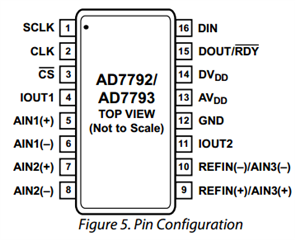Hi
There was a problem using the external ADC AD7792 in a project with SoftDevice. The problem is that when the ADC is processed in a project with SoftDevice, the waiting time for the end of the ADC conversion significantly increases - 10.5 seconds. The delay occurs at the moment when the ADC must respond to the completion of the conversion (low level RDY).
If use a project without SoftDevice (from the examples of "peripheral"), then the conversion is completed faster - 4.5 seconds.
I also tried to comment out the initialization of everything connected with bluetooth, leaving only the timer and ADC processing functions, but it did not give any results. Therefore, I can not understand why in projects where bluetooth is used (from the "ble_peripheral" examples), such a delay occurs.
To control the ADC, I use the usual pin switching. I do not use SPI module.
Maybe someone came across a similar or there are suggestions, what could be the reason ?
Chip: SKB501 (analog nRF52840);
SDK: nRF5_SDK_15.2.0;
Softdevice: s132_nrf52_6.1.0_softdevice;
Thank you in advance.



